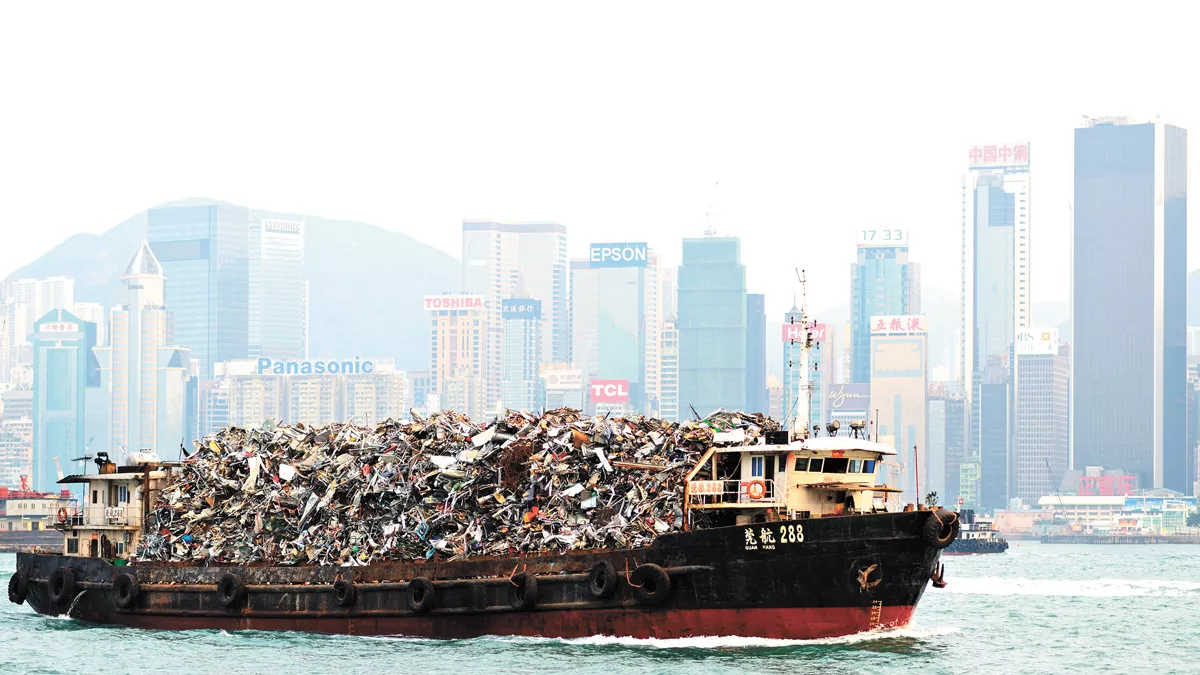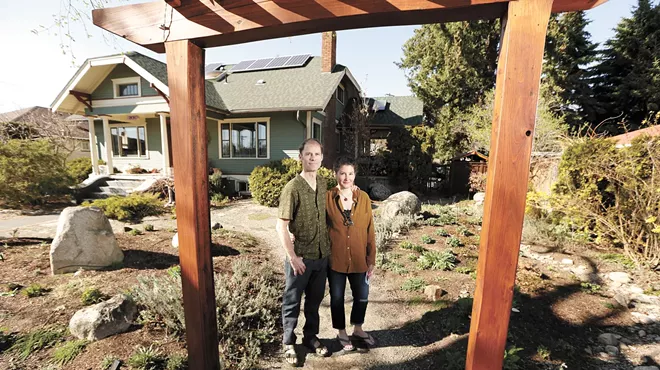
The dirty truth about recycling is that a lot of material still ends up buried or burned.
In fact, the Environmental Protection Agency reports that less than 9 percent of all plastic in the U.S. is recycled (closer to 29 percent for the easiest-to-recycle plastics).
Yet more plastic is being created every year. In a March episode of Last Week Tonight, John Oliver pointed out that production is skyrocketing: "Half of all plastics ever made have been produced since 2005."
Not helping matters is that at the curbside collection level, people often muddy the system by throwing the things they assume or hope are recyclable into their bins, making it harder for sorting centers to separate the garbage from the valuable materials.
That creates problems down the road if you want that soda bottle you put into the recycling bin to actually end up being recycled into a new product. Not long ago, bales of plastics contaminated with garbage and other materials were regularly sent from the U.S. overseas to be melted into pellets or reprocessed to make new products.
But about three years ago, China announced that it would no longer take America's highly contaminated recycled waste. The new policy dictated: Either get the contamination near zero — a feat not plausible with current issues in our recycling chain — or take it somewhere else.
About 70 percent of the plastic leaving the U.S. to be recycled was going to China, and the hard truth exposed by the change in policy was that a lot of that was still going to waste. A consultant hired by Washington state in 2020 to propose solutions for plastic usage pointed out that a combination of cheap oil, low demand for recycled plastic resins, cheap ocean shipping to Asia and lax controls on plastic exports "all contributed to a 'recycling' system for plastic" that doesn't actually "reliably deliver environmental benefit."
All of that may seem bleak when coupled with the news that some areas are also reducing how often they pick up recyclable materials (for Spokane, service drops to every other week starting in May), but some in the recycling biz say that may actually reduce the temptation to throw extra garbage into recycling bins.
More importantly, with the added pressure to fix the system lately, the Pacific Northwest is moving toward policies that will not only better ensure materials are actually recycled, but will also hold companies more accountable for their choices.
CREATING A MARKET
While a lot of plastic is highly recyclable, you need companies that will actually convert it into usable raw material again, and then other companies that need that material to make their products.Recognizing the issues highlighted when China tightened its policies, Washington state lawmakers in 2019 directed the departments of Ecology and Commerce to form the Recycling Development Center, which is tasked with creating markets for recycled materials.
"It was causing an ecological problem. ... The U.S. has to deal with its own stuff," says Kara Steward, the state's Recycling Development Center coordinator, of the old method of shipping bales to Asia. "What the center is trying to do is build up the domestic demand for those materials. Why would we ship it across the ocean for someone to make it into something when we could do it at home and build that circular economy?"
For the center's part, helping connect sources of recycled goods with private industry could look like helping a pulp and paper mill get more of the cardboard being tossed out in the state every day, she says. Or it could look like connecting a company that has excess plastic waste with another that needs that particular source in order to make their packaging or product.
The center is overseen by a 14-member advisory board with membership ranging from the manufacturing end of things to people with scientific expertise on cutting-edge techniques for recycling and reuse. While the pandemic delayed some work the Legislature requested, the center will soon be looking at the baseline of what's happening with materials in the state now, and seeking opportunities for growth.
Steward says that while she won't have money to help private companies, in some cases she's been able to connect someone who calls her looking for resources with someone else who has that answer.
"We don't have a big bank account, but I think the best thing we offer is facilitating the connections," she says.
For instance, Steward says, maybe a company has a machine to rip apart jeans and old T-shirts into thread that can be used to make new fabrics, but they need to know how to contact donation centers or textile manufacturing sites to better learn how they can divert even more material from dumpsters and landfills.
The center may also eventually help connect people who have innovative ideas with a list of possible funding sources like grants, loans or other outside funding, Steward says. Plus, as more is learned about new ways to reduce, reuse and recycle materials in the state, and as more of the specific problems with material collection come to light, the center will be able to propose more solutions to lawmakers.
FIXING THINGS THROUGH POLICY
One solution the Washington State Legislature voted on this session includes requiring plastic beverage containers (and possibly other household bottles) be made with increasing amounts of post-consumer recycled content over the next decade.As written at the time the Senate passed its version of the measure, Senate Bill 5022, on April 7, bottles would need to be made with at least 15 percent post-consumer recycled plastic by 2023, a rate that rises to 25 percent in 2026 and then 50 percent by 2031.
While some plastic industry experts have said it could be difficult or impossible to meet those goals under current conditions, others agree that requirements like that can create demand for recycled resins that aren't popular because it's cheaper to make brand new plastic.
Driving demand for recycled materials is just one of 10 recommendations to come out of Cascadia Consultant Group's 2020 study on plastics in the state — work that was also requested in 2019 by the Legislature.
Another significant recommendation from the group includes creation of an "extended producer responsibility" or EPR, also known as "product stewardship." EPR policies put more of the onus for a product's end life on the companies that create them, says Alli Kingfisher, plastics policy specialist for Ecology.
"Washington already has a number of examples of product stewardship, such as electronics recycling, how you're now able to take electronics to a number of locations across the state," Kingfisher says. "Paint is another one just getting started here in Washington. You no longer have to let all your cans dry out so you can throw them in the trash. You can instead return them to retailers or other locations."
An EPR program would cover many more products, and while lawmakers introduced a bill that would have done that this session, it didn't advance.
However, two of the other 10 recommended policy changes are included in SB 5022.
"The environmental community is very happy the bill includes a ban on Styrofoam or expanded polystyrene in food containers, recreational coolers and packing peanuts," says Heather Trim, who helped draft 5022 and is the executive director of the nonprofit Zero Waste Washington. "When we do beach cleanups, we see a lot of Styrofoam."
Rounding out the trifecta of proposed solutions: The legislation includes a new rule mandating that people need to ask to receive single-use food service products such as plastic utensils, straws, and condiments at restaurants rather than automatically getting them.
Also, looking ahead, Trim says environmental groups hope to work on a massive overhaul of the state's recycling system with more legislation next year.
"We want to be able to take the metal, the plastic, the glass and have that all be processed here in Washington, creating jobs here," Trim says. ♦


